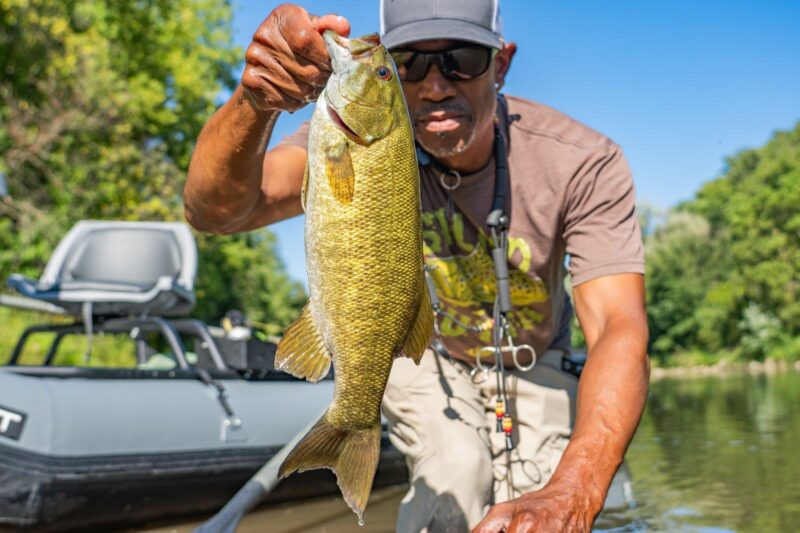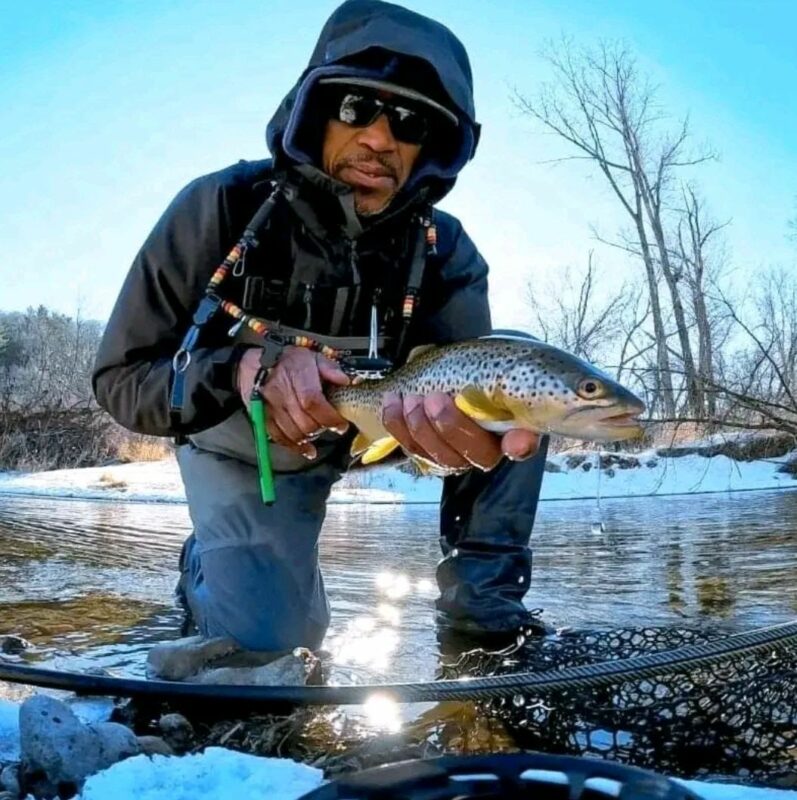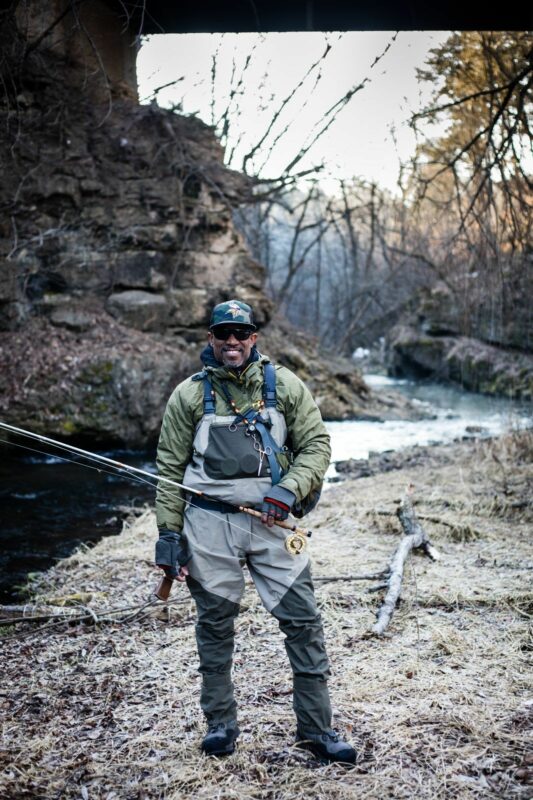
Written by Gunnar Carlson for Upstream’s Care for Place Fellowship
Scot Simmons is a 54-year-old Minnesotan from Bloomington who loves the outdoors, this passion led him to fly fishing. He recalls the first time he went fly fishing being an invitation from his father when he was 16 or 17 years old and was offered the chance to go steelheading on the Knife River. Scot wasn’t used to wading and slipped while crossing the river. The next thing he remembers was his legs going over his head and being carried downriver. “I felt like my dad saved my life from floating away into Superior”. In 1998 he landed his first steelhead and he was “all in” after that. It was about 15 years ago that he gave up spinning reels and started fly fishing exclusively, and now that’s what he does both personally and professionally. Scot is a new fly fishing guide. After years of taking friends out and showing them his favorite places to land fish, he started guiding professionally in 2023. Scot also happens to be a Black Minnesotan. I sat with him recently to interview him about his love of fly fishing, his decision to become a guide and his experience as a Black outdoorsman.
We began our conversation by talking about his Minnesota story. Scot asked what I meant by the question and I told him I wanted to know whatever came to mind when I asked and he immediately answered by talking about the Vikings. “I remember the Met Center in Bloomington, with the Purple People Eaters. We lived close to there.” Sports were Scot’s original way of falling in love with Minnesota. He recalls a certain Vikings helmet he wanted as a kid, and when he got it he really felt like a Minnesotan. As for his love of the outdoors, he relates that to his childhood and family outings and remembers going to Lake Minnetonka to fish. He talks about bringing their catch home to fry up and eat. He laughs and looks distant into his memories as he tells me about how quiet it would always be around the table when they ate that fresh fried fish and hush puppies. He also recalls cross-country skiing with his family in the Lutsen area.
When I asked about how Scot got into fly fishing he immediately talked about how he just loved the act of fly fishing and not even necessarily catching fish. This seems to be a thing for fly fishers, it’s not really about landing the fish as it is about enjoying the act of fishing. Scot proves this thought of mine when he tells me he was pre-fishing on the Mississippi the night before our interview and it was “awful”. He explained that the fish just weren’t there in the numbers he expected due to the low water. After complaining about this he smiled and said it was still a beautiful night on the river and talked about just being out there and getting the opportunity to enjoy nature.
 We talked about his father’s influence on Scot’s fly fishing, who had fished the North Shore for 40-plus years. He noted his father started to share his fishing time with Scot and kept his fishing spots and techniques to himself for a long time. “It was his serenity”. Scot shared how he now recognized his dad’s fly fishing was his own space and a refuge from the responsibilities of work and family. This seems like a realization made by a son who, now having a family and responsibilities of his own, has recently learned to appreciate time like this himself. He talked at length about how his dad worked at the U of MN and “needed” his own thing and fly fishing was that thing. Scot ends talking about his father by telling me how special he felt it was that he ever shared his thing with him and how proud he was of that gift from his father. Scot realized he wanted to be a fly fishing guide after people kept telling him he should do it and reaching a point with his old job that he felt it was time to move on. He talked about the thought process behind his decision and the realization that he really enjoys putting people on fish but he was worried that making fishing his job (and adding money into the mix) would spoil his passion.
We talked about his father’s influence on Scot’s fly fishing, who had fished the North Shore for 40-plus years. He noted his father started to share his fishing time with Scot and kept his fishing spots and techniques to himself for a long time. “It was his serenity”. Scot shared how he now recognized his dad’s fly fishing was his own space and a refuge from the responsibilities of work and family. This seems like a realization made by a son who, now having a family and responsibilities of his own, has recently learned to appreciate time like this himself. He talked at length about how his dad worked at the U of MN and “needed” his own thing and fly fishing was that thing. Scot ends talking about his father by telling me how special he felt it was that he ever shared his thing with him and how proud he was of that gift from his father. Scot realized he wanted to be a fly fishing guide after people kept telling him he should do it and reaching a point with his old job that he felt it was time to move on. He talked about the thought process behind his decision and the realization that he really enjoys putting people on fish but he was worried that making fishing his job (and adding money into the mix) would spoil his passion.
I asked about the significance of being a Black guide in a traditionally white space like fly fishing. Scot talked about how many white people expect to see people of color fishing, but not necessarily on the water. He feels that people are used to seeing us fishing from the bank, sitting on a bucket. Scot fished this way as a kid and distinctly felt like some people were looking down on them as they went by in their boats. He finished this thought with a smile and an enthusiastic statement of how he loves to see Black people on the water. “I just love to see it normalized!” We talked about how we have it much easier than those who came before us, but there’s still a lot to overcome. Scot asks me if I ever notice other fishermen not nodding or waving when we see each other on the water. As fishermen of color we notice when we don’t receive the customary nor or wave from other fishermen. Scot says he’s the type of guy to just go out and do what he wants to do, but for a newcomer, this could be very intimidating. In regards to feeling watched but not greeted he says, “I wish they would just say hi…”
Q&A
TELL UPSTREAM ABOUT YOUR THE FIRST GUIDING.
He talked about the stress leading up to that trip. The client was a competent angler and his daughter. It was the morning after a rain, so the river was high and muddy. Scot was worried about putting his clients on fish. Would the spots he scouted produce under the current conditions? Should he find different spots? These are the worries of a guide whose livelihood depends on people catching fish and feeling good about their day. Well, they did catch fish! Scot talks about how the daughter caught her first trout on the fly. More importantly, she caught that fish on a rod that her grandfather built. He talked about witnessing a father brought to tears at seeing his daughter catch her first fish. We took a minute to just revel in the power of this moment that all fly fishers recognize as a key moment in your fishing career. “That first fish just hits different”. Scot talks about how he’s really interested in people and building relationships. He sees himself as a bridge among the races. He strives to show the good in all people and how not all Black folks are a stereotype.
WHAT UNIQUE CHALLENGES AND ADVANTAGES HAVE YOU DEALT WITH AS A BLACK GUIDE?
The biggest challenge was his own worry about clients not knowing he was a person of color before the trip and the possible awkward interaction at the river. He worries about how clients will react to his personality and mannerisms. “I’m loud. I celebrate when we catch fish. I WILL embrace you!” These cultural differences and not knowing how best to guide were major concerns for Scot when he started but after a few months of guiding, he admits his biggest challenge is the need to get out of his own head and acknowledge that he knows what he’s doing. “I have no challenges because of the client”. As for advantages due to his lived experience, Scot says being Black and growing up in a white community taught him how to adapt to different cultures and ethnicities. He also believes his education and being knowledgeable enough to hold a conversation is an advantage. He believes people always walk away impressed with him because of his authenticity and passion. “Fly fishing changed my entire landscape. I never thought I could be like Babe Winkelman!” We talked about watching fishing shows as kids and how we both idolized Al Linder and Babe Winkelman. Scot recalls a time when a client wanted to fish a different fly than he recommended. Scot watched as they weren’t catching fish but then, when they eventually switched to his recommendation, they caught a fish almost instantly. It was a big fish. “That was a very special moment!” 
Scot figures he spends about 50% of his time teaching how to fish as opposed to guiding to the fish. “It all depends on the experience of the client. The teaching may be falling on deaf ears.” Scot also pointed out learning about the need to evaluate his client’s ability himself as opposed to accepting self-assessments. He had a client recently who reported being a proficient caster and so he chose a challenging stretch of water that required technical casts. It turned out the client was not able to make the necessary casts. “If I had spent a half hour on the bank with them I would have known and we could’ve adjusted immediately.” There’s no frustration in Scot’s voice, he’s just trying to adjust to his clients and meet them where they are. I wanted to know if he preferred novice or accomplished anglers and he just shrugged. He did note that an accomplished angler, “means we can have conversations more”.
HOW DO YOU CARE FOR PLACE WHILE YOU WORK?
During his time guiding, Scot had the opportunity to see how people are affecting the environment. He sees a lot of garbage and an overall lack of concern or appreciation for the water. We talked about stewardship and catch and release versus harvesting of fish. He talks with clients about posterity and caring for these spaces. Scot then told me a story about working with a client who was careless with removing a hook from a fish. “He gutted that thing and just threw it down without even thinking twice. I was just disgusted” He had a conversation with the client, who had just assumed that he would be keeping the fish. Scot is a catch-and-release guide, for the most part. He talks about how he made the tough decision to end the trip and lose the client. Scot has an intentionality he puts into his business in regard to caring for our shared natural spaces. He speaks about stewardship for the sake of nature and the future, not to protect the resource that provides his income.
TELL US ABOUT YOUR FAVORITE DAY ON THE WATER.
When I asked what Scot’s favorite day on the water would look like he immediately said it would be the Root River. Finding a place to float, fish and then camp for the night. He talked about the ritual of getting up early to head down to the river. Scot loves the landscape and watching it come alive as the sun comes up on the rolling hills. If he’s guiding, it’s any day he can help clients catch fish and make memories.
WHAT IS YOUR GREATEST LIFE LESSON FROM FISHING AND GUIDING?
It began with a father and son, the father had traveled to MN to bring his son to college and they were taking a guided fishing trip as their last hurrah together before the son set out on his own in college. They caught fish, had a wonderful time and enjoyed their day. Scot proudly shared how he had received a note from the dad after the trip expressing how great their trip had been and how his son had asked if he could go fishing with Scot again. The dad mentioned in his note that he felt better about his son being at school in MN knowing he could fish with Scot. I got a sense of the pride Scot felt that a father was letting him know he felt he could trust in him to help keep his boy safe, happy and grounded as he found his own way in the world. “That meant something”.
After this we talked at length, not as interviewer and interviewee, but as two men of similar age who both happen to be Black and share a love of the outdoors, Minnesota and fly fishing. We talked about the joy of tying flies, the way it all gets harder as we get older. Our desires to see more people who look like us enjoying this amazing sport and the wonderful natural resources of the state we both love. We talk about the benefits we experience when being outdoors.
I learned that Scot is the Youth Education Chair for the MN Trout Unlimited chapter. We discuss the importance of sharing these things with youth to help foster the next generation of outdoors people and fly fishers. The ability to read the river and know what fly might work on any given day is a skill that requires a bit of knowledge and there’s a bit of entomology, weather forecasting, current and pool reading. I find myself thinking back to the beginning of the interview and Scot remarking on how his father shared his knowledge later in life. Scot is sharing as much as he can now, the knowledge and democratizing fishing is his mission. Helping everyone make memories seems to be the main motivation for Scot’s guiding. Putting people on fish and watching others land them brings Scot joy. It seems to me that is what makes him a great guide, his passion for fishing combined with his ability to find fulfillment in seeing others succeed in doing the catching is immediately apparent. Scot smiles as he tells me about pre-fishing and scouting rivers. He truly loves what he does and I’m sure he’ll continue to be a source of memories for others for many years to come.
What’s Your Upstream Story?
We share stories of stewardship written by and about Minnesotans like you! Share your story here.